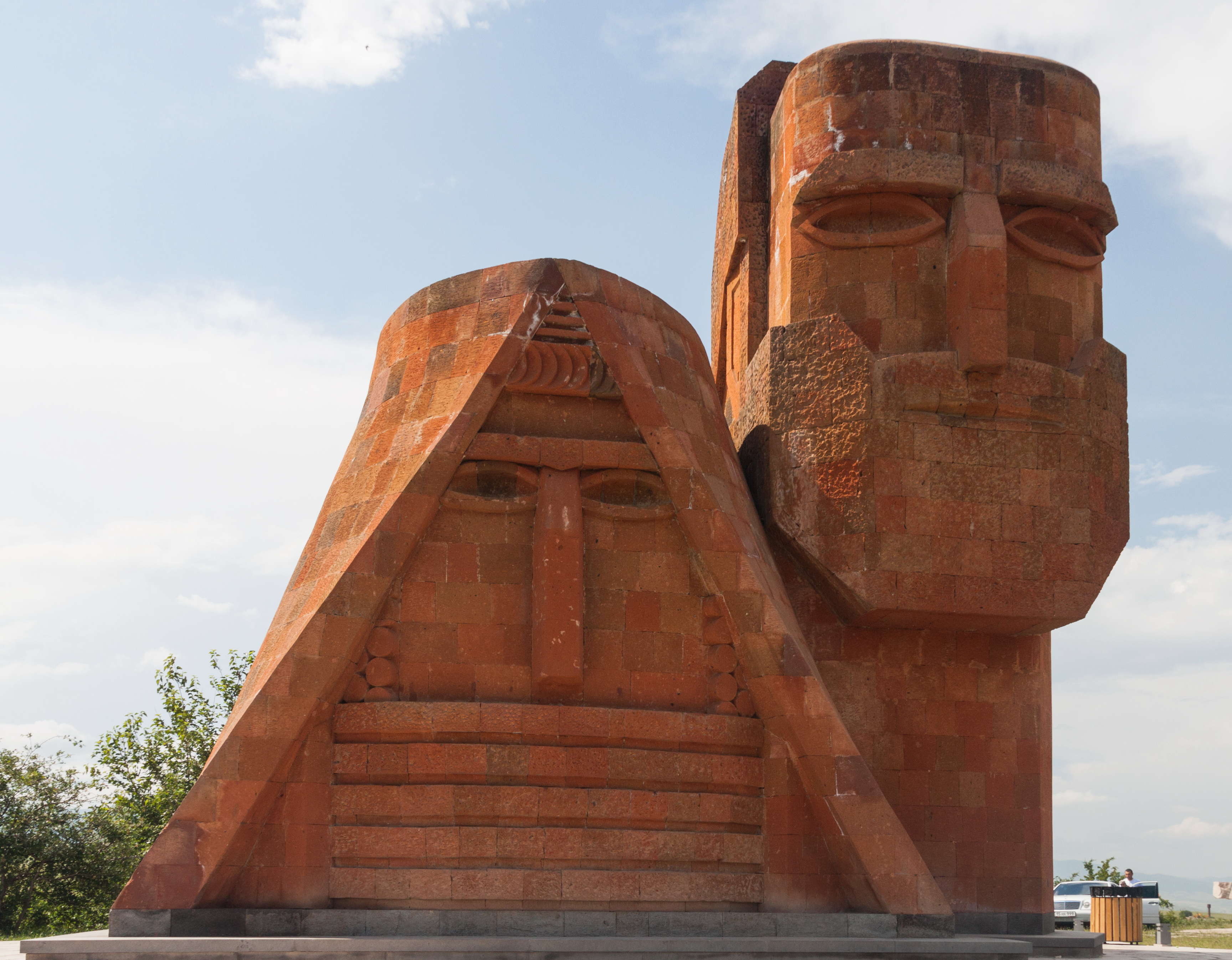We Are Our Mountains on:
[Wikipedia]
[Google]
[Amazon]

 ''We Are Our Mountains'' ( hy, Մենք ենք մեր լեռները, translit=Menk' enk' mer leṙnerə) is a large monument north of
''We Are Our Mountains'' ( hy, Մենք ենք մեր լեռները, translit=Menk' enk' mer leṙnerə) is a large monument north of

 ''We Are Our Mountains'' ( hy, Մենք ենք մեր լեռները, translit=Menk' enk' mer leṙnerə) is a large monument north of
''We Are Our Mountains'' ( hy, Մենք ենք մեր լեռները, translit=Menk' enk' mer leṙnerə) is a large monument north of Stepanakert
/ az, Xankəndi, italic=no
, settlement_type = City
, image_skyline = File:StepanakertCollage.jpg
, imagesize = 300px
, image_caption = From top left: Holy Mother ...
, the capital city of self-proclaimed Republic of Artsakh, de-jure part of Azerbaijan. The sculpture, completed in 1967 by Sargis Baghdasaryan
Sarghis Baghdasaryan, also Baghdasarian ( hy, Սարգիս Իվանի Բաղդասարյան; September 5, 1923 in Banadzor – June 19, 2001 in Yerevan), was a Soviet Armenian sculptor. He is best known for his 1967 work ''We Are Our Mountains'' ...
, is widely regarded as a symbol of the Armenian heritage of Nagorno-Karabakh. The monument is made from volcanic tufa and depicts an old
Old or OLD may refer to:
Places
*Old, Baranya, Hungary
*Old, Northamptonshire, England
*Old Street station, a railway and tube station in London (station code OLD)
*OLD, IATA code for Old Town Municipal Airport and Seaplane Base, Old Town, Mai ...
man and woman hewn from rock, representing the mountain people of Karabakh. It is also known as "tatik-papik" (տատիկ-պապիկ) in Armenian, which translates as "Grandmother and Grandfather". The sculpture is prominent in Artsakh's coat of arms.
Eurovision image controversy
The use of the monument during a video clip preceding a performance at Eurovision Song Contest 2009 was the first of several political conflicts during the competition surrounding Armenia and Azerbaijan. The conflict stemmed from an introductory "postcard" video played before Armenia's performance in a semi-final round, which depicted the monument alongside other symbols of Armenia. Representatives from Azerbaijan complained to theEuropean Broadcasting Union
The European Broadcasting Union (EBU; french: Union européenne de radio-télévision, links=no, UER) is an alliance of Public broadcasting, public service media organisations whose countries are within the European Broadcasting Area or who ar ...
about the use of "We Are Our Mountains" in the Armenian intro, since the territory of Nagorno-Karabakh is '' de jure'' part of Azerbaijan. In response to the complaint, the image was edited out of the video in the finals. However, Armenia retaliated for the decision by including multiple images of the monument in its voting presentation—on a video screen in the background, and on the back of their spokesperson Sirusho's clipboard.
In popular culture
This monument is featured in the artwork of the songs "Protect the Land
"Protect the Land" is a song recorded by Armenian-American heavy metal band System of a Down. It was released as a double A-side single with "Genocidal Humanoidz" on November 6, 2020, through American Recordings and Columbia Records, to raise ...
" and " Genocidal Humanoidz" of the Armenian-American band System of a Down to draw attention to the 2020 Nagorno-Karabakh war
The Second Nagorno-Karabakh War was an armed conflict in 2020 that took place in the disputed region of Nagorno-Karabakh and Armenian-occupied territories surrounding Nagorno-Karabakh, the surrounding territories. It was a major escalation of ...
.
See also
*'' Menq Enq Mer Sarerệ''References
External links
* {{italictitle Stepanakert Republic of Artsakh culture Armenian culture Buildings and structures in the Republic of Artsakh Monuments and memorials in the Republic of Artsakh 1967 sculptures Stone sculptures Tourist attractions in the Republic of Artsakh Buildings and structures in Azerbaijan Tourist attractions in Azerbaijan